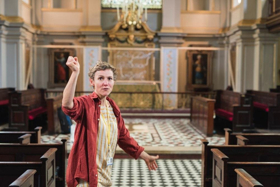Review: THE END OF HISTORY, St Giles-in-the-Fields

![]() If Rod Taylor's Time Machine were situated in the garden of St Giles-in-the-Fields Church at the end of Soho's Tin Pan Alley, it would have witnessed a lot more than changing hat styles and skirt lengths. Uses from leper colony to hipster hangout (and everything in between) have been foisted on this patch of land, a piece of London that might be as London as London gets.
If Rod Taylor's Time Machine were situated in the garden of St Giles-in-the-Fields Church at the end of Soho's Tin Pan Alley, it would have witnessed a lot more than changing hat styles and skirt lengths. Uses from leper colony to hipster hangout (and everything in between) have been foisted on this patch of land, a piece of London that might be as London as London gets.
So it's fitting that site-specific specialists High Hearted Theatre is staging The End Of History in the church itself, the scene of the play's cathartic meeting - more of that later. Technically, acoustics are always the challenge in these high spaces, but Edward Lewis has got this one just about right, especially so on the pleasing songs that punctuate the narrative. Sit close to the action, but don't worry if you're not - and it's not too cold either!
Sarah Malin, in great form, plays Wendy, fortysomething, fresh out of a relationship, and stuck for somewhere to live, her hourly rate as an art therapist with a homeless charity hardly sufficient to pay London rents. Paul (Chris Polick, smooth but vulnerable) is in property marketing, strutting about in a pink (and Thomas Pink) shirt and carrying a couple of habits, one expensive on the pocket, the other on his health. The odd couple meet in the church when they find themselves at crossroads in their lives.
It could be twee, it could be worthy, it could be ever so slightly dull, but writer, Marcelo Dos Santos gives us two real people to spend time with. Neither is a villain, neither a hero and there are barbs for the hand-wringing Guardian readers in their Holland Park mansions as well as absent oligarchs and buy-to-letters. We're never explicitly told that SOMETHING MUST BE DONE about London's housing crisis, but we're left in no doubt that it should.
But, even in the unlikely event that you're in the audience and you don't have an interest in London's property market, the play has much to commend it. There's a warmth to the characters, a credibility in their reactions to each other and two backstories that manage to be unique, yet representative of two of London's many tribes.
Like many two-handers, I'd love to see this piece have a second life as a radio play - it would engender a sense of empathy in a city, a country, hell a planet, that needs it more than ever.
The End of History continues at St Giles-in-the-Fields until 23 June.
Photo Mike Massaro
Reader Reviews
Videos

